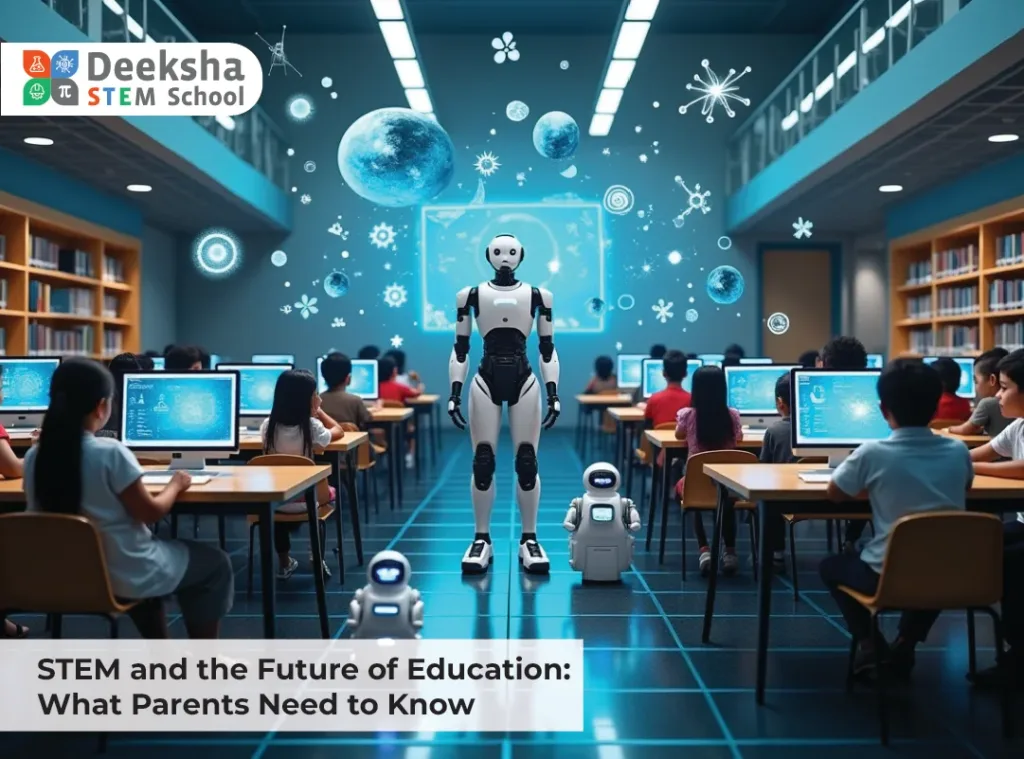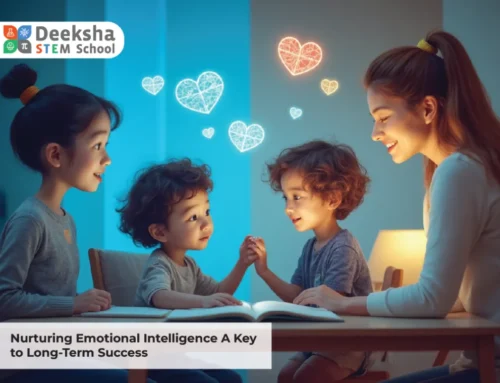The world is evolving at an unprecedented pace, driven by rapid advancements in science, technology, engineering, and mathematics (STEM). These changes are reshaping not just the job market but also transforming how education is delivered, experienced, and adapted to future needs. As emerging technologies like artificial intelligence, robotics, and data science revolutionize industries, preparing children with the right skills has never been more critical.
In this fast-paced, technology-driven era, educational institutions must go beyond traditional learning paradigms and integrate practical, future-oriented knowledge. At Deeksha STEM Schools, we embed STEM learning into every aspect of the CBSE curriculum, ensuring students are equipped to handle future challenges and excel in an increasingly digitized global economy. This guide offers parents valuable insights into why STEM education is essential and how they can foster their child’s interest in these vital disciplines from an early age.
Why STEM is the Future of Education
Education systems around the world are undergoing rapid transformations to align with the demands of the 21st-century economy. STEM education lies at the heart of this evolution by nurturing essential skills that are critical for personal and professional success:
- Critical Thinking and Analytical Reasoning: Encourages students to analyze information, evaluate solutions, and develop logical reasoning.
- Creativity and Innovation: Inspires curiosity and innovative thinking through hands-on learning experiences and experimental challenges.
- Collaboration and Communication: Builds teamwork, leadership abilities, and interpersonal skills by fostering collaborative problem-solving.
- Adaptability and Resilience: Prepares students for continuous learning, helping them adjust and thrive in a constantly evolving technological landscape.
- Interdisciplinary Approach: Encourages the integration of concepts from science, technology, engineering, and mathematics to solve real-world problems effectively.
The Impact of Emerging Technologies on Education
The integration of emerging technologies into education has revolutionized how students engage with learning materials and interact with information. Schools worldwide are adopting cutting-edge tools to offer immersive, interactive, and personalized learning experiences:
- Artificial Intelligence (AI): AI-driven platforms create personalized learning pathways, allowing students to learn at their own pace while focusing on their individual needs.
- Virtual Reality (VR) and Augmented Reality (AR): These technologies make complex concepts more accessible by providing engaging, interactive simulations and virtual field trips.
- Data Analytics: Leveraging real-time data allows educators to track student performance and provide tailored support based on individual progress.
- Cloud-Based Learning Platforms: Provide students with seamless access to resources, educational tools, and collaborative environments from anywhere in the world.
- Gamification of Learning: Incorporating game-based learning techniques fosters engagement, motivation, and a positive learning atmosphere.
How STEM Education Prepares Children for Future Careers
As technology continues to shape the global economy, the future workforce will demand skills beyond traditional academics. STEM education equips students with an array of competencies essential for thriving in tomorrow’s professional landscape:
- Technical Proficiency: Knowledge of programming languages, robotics, AI systems, and advanced technological tools.
- Problem-Solving Abilities: Encourages students to tackle real-world challenges, think critically, and develop innovative solutions.
- Research and Analytical Skills: Teaches students how to collect, analyze, and interpret data effectively for informed decision-making.
- Leadership and Initiative: Promotes proactive thinking, leadership, and an entrepreneurial mindset.
- Global Competency: Provides students with an understanding of global issues and fosters cross-cultural collaboration.
What Parents Need to Know About STEM Education
Supporting your child’s interest in STEM should start early and extend beyond the classroom. Here are some actionable ways parents can foster STEM engagement at home:
1. Foster Curiosity Through Exploration
Encouraging curiosity is essential for developing a lifelong love of learning. Parents can:
- Provide interactive educational toys like building kits, science experiments, or coding games.
- Introduce children to informative books, documentaries, and podcasts on science, technology, and engineering topics.
- Visit science museums, planetariums, and innovation hubs to inspire interest in the wonders of STEM fields.
- Encourage observation and questioning through nature walks, exploring ecosystems, or stargazing sessions.
2. Incorporate STEM into Daily Activities
Everyday life offers plenty of opportunities to introduce STEM concepts:
- Cooking Together: Teaching measurement, chemistry, and temperature concepts through baking or cooking.
- Gardening: Introducing biology and environmental science through planting, composting, and observing ecosystems.
- DIY Home Projects: Building furniture, fixing electronics, or conducting simple engineering projects enhances problem-solving abilities.
- Financial Literacy: Teach basic math concepts by involving children in budgeting, saving, and understanding investments.
3. Encourage Participation in Structured STEM Programs
Formal educational programs help deepen your child’s understanding of STEM disciplines:
- Enroll children in coding classes, robotics workshops, or science clubs.
- Support participation in science fairs, Olympiads, coding hackathons, or engineering challenges.
- Provide access to reputable online learning platforms that offer interactive STEM courses.
- Encourage collaborative group projects that promote teamwork and critical thinking.
4. Promote Inclusivity and Diversity in STEM
Creating an inclusive environment is essential for ensuring that all children feel encouraged to pursue STEM interests:
- Introduce stories featuring STEM professionals from diverse backgrounds and cultures.
- Support initiatives that promote gender equality and inclusivity in STEM education.
- Foster a safe learning space where children feel empowered to ask questions and share ideas.
- Encourage participation in mentorship programs with role models from varied professional backgrounds.
How Deeksha STEM Schools Prepare Students for the Future
At Deeksha STEM Schools, we integrate a comprehensive STEM-focused approach within the CBSE framework to prepare students for leadership roles in technology-driven industries:
1. Advanced and Inclusive STEM Curriculum
Our curriculum combines foundational academic knowledge with specialized STEM learning, developing analytical thinking, creativity, and problem-solving skills.
2. State-of-the-Art Learning Facilities
Our campus is equipped with cutting-edge technology, including modern science laboratories, robotics centers, AI hubs, and dedicated coding spaces that allow students to engage in practical learning.
3. Expert Faculty and Personalized Mentorship
Our highly qualified faculty members use innovative teaching methods and provide personalized mentorship to help students explore and cultivate their STEM interests.
4. Real-World Exposure and Industry Collaboration
We offer real-world learning experiences to help students connect classroom knowledge to practical applications:
- Industry visits and mentorship programs with leading professionals.
- Participation in national and international science and engineering competitions.
- Collaborative partnerships with research institutions, tech startups, and global innovation hubs.
5. Holistic Development and Soft Skills Training
Beyond technical proficiency, we nurture soft skills such as leadership, teamwork, emotional intelligence, and communication, preparing students to excel in dynamic global work environments.
The Future of Learning: Embracing a STEM-Driven Approach
As industries grow increasingly reliant on technology and innovation, integrating STEM education into early learning is essential for preparing children for future success. The jobs of tomorrow will demand a mix of creative thinking, technical expertise, and collaborative problem-solving abilities. Building a strong STEM foundation empowers students to adapt to technological advancements and remain competitive in a global workforce.
Conclusion
The future of education is undeniably intertwined with STEM. As parents, understanding the value of STEM education and actively supporting your child’s passion for science, technology, engineering, and mathematics can open countless opportunities for growth and achievement.
At Deeksha STEM Schools, we are dedicated to providing an inclusive and holistic STEM learning environment. Our mission is to empower students with the skills, knowledge, and confidence needed to excel in a rapidly evolving global economy. To learn more about how Deeksha STEM Schools can help prepare your child for a bright and successful future, reach out to us today.






Leave A Comment